Dan Levy’s Big Idea Behind ‘The Big Brunch’: ‘Nothing Should Be Negative, Everything Should Be Supportive’
- Oops!Something went wrong.Please try again later.
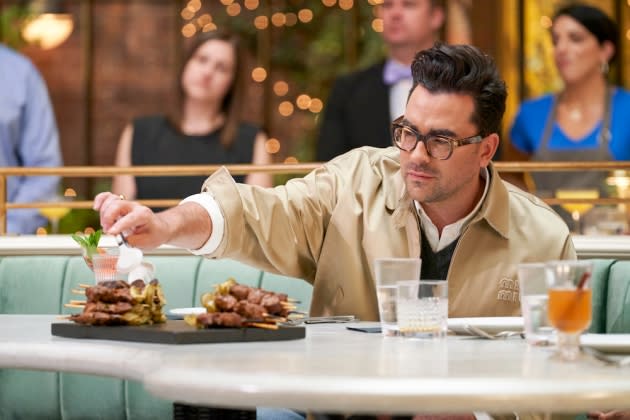
In October 2020, months into the pandemic’s decimation of the restaurant industry, Dan Levy got the idea for “The Big Brunch,” the uplifting HBO Max cooking competition that revolves around his favorite meal of the day. Levy was in bed at the time, and sprung up to “write it down from start to finish.” The next day, he called his managers to tell them about it, and when they asked Levy what exactly the show would be, he presented it to them in “great detail.”
As we sat together on a seafoam green banquette, facing the open kitchen in which the chefs cook on the show’s bistro-inspired set — designed by David Korins, of “Hamilton” fame — it was clear that those details are very important to “The Big Brunch.”
More from Variety
As is the show’s heart, with which fans of Levy’s “Schitt’s Creek” are by now well-acquainted. Levy has friends who are chefs, he said, and he feels that gathering around a restaurant table, now more than ever, is important. “The desire to bring people together through a shared common experience is something that I thought was really beautiful and profound,” he said.
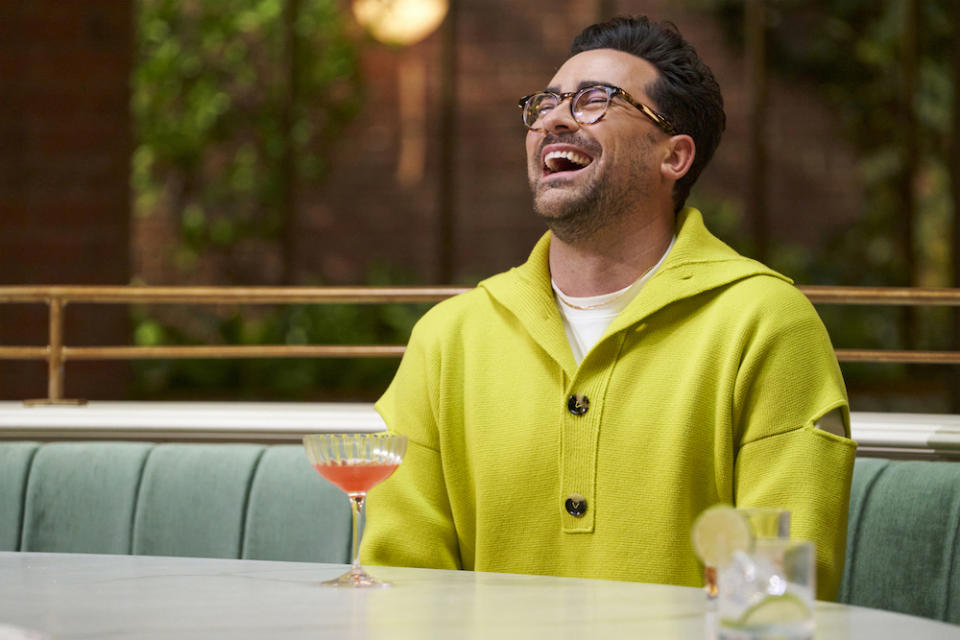
The final two episodes of “The Big Brunch” — Levy’s first self-generated project since “Schitt’s Creek” ended its six-season run in April 2020, and would then go on to a historic Emmys sweep in every major comedy category — drop on HBO Max on Thanksgiving Day. In its final two episodes, the “Big Brunch” group will go from five semifinalists to three finalists, and then to one winner (no spoilers here), who will receive a cash prize of $300,000.
That payoff is larger than those bestowed by other cooking competitions for a reason. “I didn’t want it to feel performative,” Levy said. “I really wanted the prize to change somebody’s life.”
“Big Brunch” executive producer Andrew Fried, the president of the show’s producer Boardwalk Pictures, echoed Levy’s sentiment about wanting to change the winner’s life. “If we didn’t accomplish that, it was sort of like, what’s the point?” he said during an interview from the production office.
“The Big Brunch’s” good-vibes-only ethos also leans hard on the chefs’ “real, personal narratives,” as Fried put it, which began with a group of 10. Which is all to emphasize that “there are no losers on our show,” Fried said, and even those eliminated early have been given “a platform to amplify themselves and their brands.”
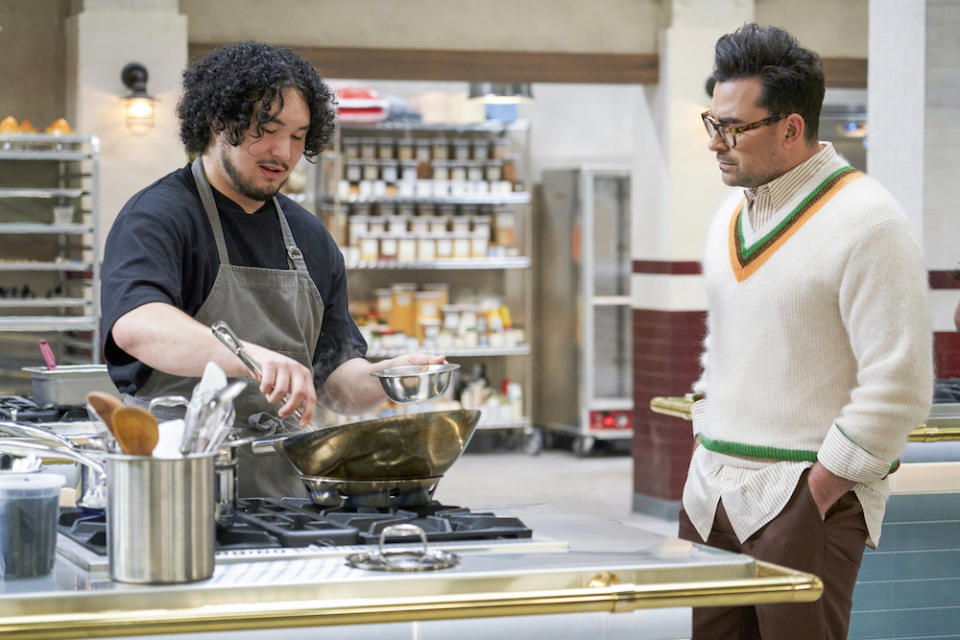
If the early years of Bravo’s groundbreaking “Top Chef” assembled talented casts of fine-dining chefs with backgrounds in French cooking, all of whom wanted to open their own restaurants, well — the cast of “The Big Brunch” shows how much times have changed. Among the show’s semi-finalists are J Chong, a queer woman originally from Toronto who specializes in Cantonese cuisine; Roman Wilcox, a vegan chef from El Paso, Tx., who runs a community diner in a food desert; and Daniel Harthausen, who specializes in Korean-Japanese cooking, and has a successful pop-up restaurant in his hometown of Richmond, VA. It’s such a varied group that even the show’s judges — chef Sohla El-Waylly and restaurateur Will Guidara — have learned from them. For El-Waylly, who was one of the stars of Bon Appétit’s popular “Test Kitchen” YouTube channel, and then helped lead the summer 2020 uprising against the magazine’s tokenizing and underpaying of the channel’s BIPOC chefs, the shift has been a long time coming. “There was a time where everything had to be French to be considered fancy or technical,” she said. “And it’s nice to see that we’re so far past that here.”
El-Waylly added that Wilcox’s vegan creations in particular have opened her eyes: “It’s a lot of stuff I’ve never had before. I’m just like, ‘Whoa, maybe I could be vegan!’”
“I’m being introduced to new things,” said Guidara, who’s the co-author of four cookbooks, and the former co-owner of Make It Nice, the restaurant group that included Eleven Madison Park. “And there’s this dynamic in the relationship where I feel totally comfortable saying, ‘I don’t have a reference point for this — explain this to me.’”
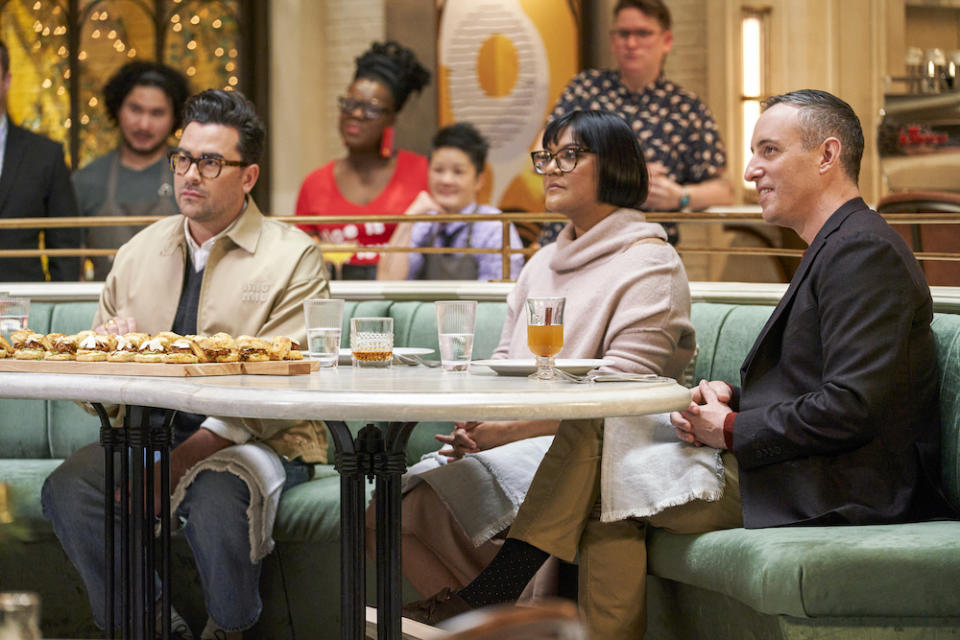
Nor does every chef in the cast simply want to open their own restaurant. As executive producer Sarina Roma, also of Boardwalk Pictures, put it: “Every single person in the culinary world has a different dream — you might want to write a cookbook, you might want a food truck, you might want a cooking show. How can we support those chefs in getting what their specific dream is?”
Throughout “The Big Brunch” competition, the judges have focused on giving meaningful critiques, even in the rare moments when a chef has whiffed: There are no Simon Cowells here. “The whole thesis of this is they’re gonna go off and do something bigger,” Guidara said. “Whether they win this or not, this is a platform that should support their bigger dreams. And that’s just — that’s awesome.”
“Everyone’s just trying to do their best,” El-Waylly said. “And it’s been really fun to see how much they’ve grown since the first episode.” (During my late-March set visit, I tasted everything made for the Nov. 24 holiday-themed seventh episode, which included lobster mashed potatoes and vegan soy curls, among other revelations. And I can happily testify to the quality of the chefs’ food.)
Levy is currently in Europe filming “Good Grief,” his feature directorial debut for Netflix, which he also stars in and wrote. But on “The Big Brunch” set, he was reminded of “Schitt’s Creek,” his co-creation with his father Eugene that propelled him into stardom.
“‘Schitt’s Creek’ was all about texture and feel and detail,” he said, “and making sure that not only were the scenes we were writing funny, and that the actors were doing the most with it — but that the actual world we were creating was thoughtful and enjoyable and aspirational in a way that was comforting to people.”
One thing I noticed watching the cooking in action was that the chefs were helping each other, despite being competitors. “There’s five people left, and if you’re still in it, you can taste it, right? Like you can actually see yourself winning,” Guidara said, marveling. “And at the end of everyone’s time, they’re all helping each other plate!”
“It does feel, oddly, like the characters who are playing in the sandbox we’ve created embody the spirit of the show from the first day that we developed it,” Fried said. “And I don’t think we could have forced that.”
That spirit is exactly what Levy wanted from “The Big Brunch.” “Nothing should be negative, everything should be supportive,” he said. “We don’t want anyone to feel bad, even if they end up going home. They have to know that even just being here was a win in and of itself.”
Things have changed since March at HBO Max, with the pain of post-merger cost-cutting casting a shadow over Warner Bros. Discovery. But on the set of “The Big Brunch,” the principles seemed excited about the possibility that this could be a franchise.
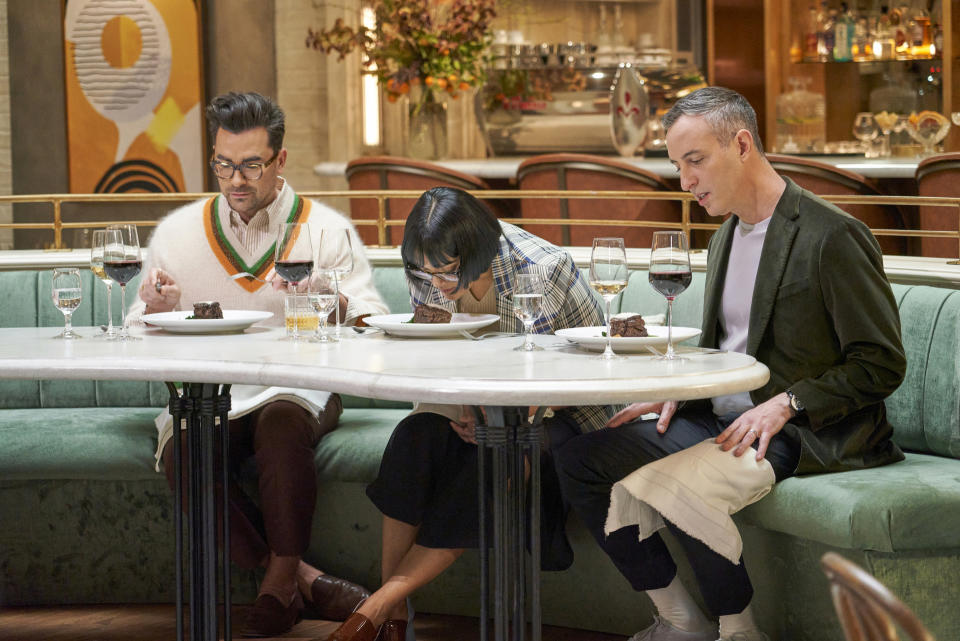
“Hell yeah!” Roma responded when asked whether Boardwalk would want to do a second season. “Absolutely,” Fried said in agreement. “We’ve tapped into something here that adheres to a lot of the convention of these shows that we love — and veers just off of it to create something that is unique and singular.”
Levy’s vote, of course, is the one that matters most. And yes, he’d very much want to do more, thank you. “I never thought I would go back into unscripted television unless it meant something,” he said. “I had no idea just how special this whole thing would be.”
It’s the teamwork he likes most of all — with his fellow judges, with the production, and most of all, among the contestants.
“It’s a really emotional affirming experience to watch camaraderie like that,” Levy said. “Because I’m so accustomed to just people tearing each other down.”
Best of Variety
Sign up for Variety’s Newsletter. For the latest news, follow us on Facebook, Twitter, and Instagram.

